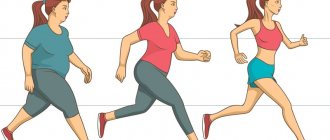The benefits and harms of evening running
Research has shown that most workouts are best done in the evening. Body temperature reaches its peak, which leads to elasticity and more productive work of muscles and joints. After waking up early, the muscles are less ready for intense physical exercise, while by the evening they are already warmed up enough to perform well in running even over long distances .
Lung function was found to be more than 6% better in the afternoon than at any other time. In such conditions, the athlete feels calmer and more comfortable, there is additional ease in movement, due to which endurance increases. Thus, running in the evenings can be considered an excellent alternative for those who do not have enough time to exercise in the morning .

If motivation is still not enough, then you can study in more detail what benefits of running in the evenings can be:
Stress relief
This is one of the main reasons why experts recommend running in the evening. Everyone knows that running helps produce endorphins, the so-called happiness hormone. After a hard day at work, such an energy boost will come in handy. All the stress that has accumulated at work can be relieved with just a short evening jog. This measure will also help avoid nervous breakdowns and depression in the future. As a result, the runner will feel more balanced and less short-tempered.
Fighting insomnia
Running at a moderate pace for not too long a time can help combat insomnia. During training, all the negativity accumulated during the day is removed, thoughts come into order, the body is saturated with a sufficient amount of oxygen - all this together can have a positive effect on the quality of sleep and its duration. It is important to remember that excessive stress can lead to the opposite result, so you need to carefully monitor your well-being and avoid overwork.

Cleansing the body
It has been scientifically established that in the evening the body's excretory system begins to work more actively. So running in the evening can help enhance this effect. As a result, metabolic processes lead to cleansing the body of harmful and unnecessary substances that could lead to negative health consequences. To get the maximum benefit, you need to drink water and keep your body hydrated while jogging.
Getting rid of the calories you eat
A definite plus for those who want to get their body into ideal shape .
Evening workouts help get rid of extra calories that were eaten during the day. This will work especially effectively if after a run before bed there is no dinner in sight. Another advantage of such running may be that after exercise during sleep, the energy accumulated in the muscles will begin to be spent, using fat deposits.
Nutrition while running
There is a large number of contradictions surrounding the topic of nutrition while running, and on many sites you can find completely contradictory data. In order not to increase the number of universal opinions and judgments, in my article about nutrition when running, I asked a real expert in the field of nutrition - a nutritionist - to share.
Expert commentary
Nutritionist with a full higher medical education received in Canada from McGill University (included in the TOP 20 best universities in the world) - Natalya Nefedova:
“A woman doing ordinary physical exercises. loads can adhere to a normal diet: from 1800-2400 kcal/day, of which 45-55% carbohydrates (3-5 g/kg/day, 10-15% protein (0.8-1.0 g/kg/day) and 25-30 % fat (0.5-1.5 g/kg/day).
Running is a moderate-intensity exercise for which half the energy comes from the aerobic breakdown of glycogen (glucose in the compound) of muscle tissue, and the other half from circulating glucose and fatty acids in the blood.
Therefore, in order for physical the loads were effective, it is necessary to properly provide the body with the necessary energy reserves.
Running in the morning on an empty stomach
A big mistake is running in the morning on an empty stomach. The glycogen reserve in the liver is used up overnight and, as a result, it becomes impossible to maintain the desired level of glucose in the blood using this method.
Many people believe that running on an empty stomach will provide intense fat burning - this is not true at all. If you do not have breakfast correctly and do not provide the body with glucose, catabolism of muscle tissue will be used, not fat. Also, in order for fat catabolism to occur, the presence of carbohydrates cannot be avoided - a simple law of biochemistry.
Nutrition before running
Therefore, to run effectively, you must first fuel yourself. It is not at all necessary to eat a full breakfast unless eating and running are separated by 3 or 4 hours.
Running on a full stomach can lead to indigestion, nausea and vomiting. But the food should be high in complex, preferably whole grain, carbohydrates and low in fat, since the latter retains food in the stomach and takes a long time to be “digested.”
An hour or less before training, I recommend eating something with 100 calories. For example, a banana or an orange, or half a bagel or 25g of cereal. If the workout follows 2-3 hours after a meal, then you should eat a full meal of 300-400 kcal, such as a turkey sandwich with baked potatoes.
Post-workout nutrition
You should also eat after training to synthesize and restore muscle tissue. Complex whole grain carbohydrates and 5-9g of protein for every 100g of carbohydrates will also help here.
This will help not to lose, but to increase muscle mass and ensure the production of an adequate amount of anabolic hormones. It is best to eat within an hour after training to avoid muscle loss.
If for some reason you cannot immediately eat a full meal, then a fruit snack will come to your aid, providing carbohydrates and electrolytes lost during training.
Harm?
Running in the evening can cause harm mainly due to increased air pollution during these hours. This is especially true for large cities. If in the morning you can breathe more or less freely, then in the evening the concentration of harmful substances in the air reaches its peak. To protect yourself from such negative impacts and get only the benefits from running, you need to be wise when choosing places for jogging. It is better to avoid highways and roads with high traffic; preference should be given to parks and squares, green areas where there are many trees and no traffic. In such places, running is not only useful, but also pleasant.

How to run in the evening: clothes
When choosing clothes, rely on your own comfort and weather conditions. There is no fundamental difference in time when you run - dress according to the weather.
- Underwear: cotton briefs, for women – sports bra, socks; in winter - thermal underwear;
- Outerwear. In summer, sports shorts, tights (tight pants), loose sweatpants, a sports top or T-shirt (necessarily made of a breathable material, such as linen or cotton) are suitable. In windy weather - a windbreaker or light jacket. For the cold season, wear a jacket on top, maybe a ski suit, a hat and gloves. If the jacket does not tightly cover the neck, use scarves and headbands (put on over the head);
- Shoes . For training, purchase training sneakers that provide comfort and support for your feet while running.
Pros and cons of running in the evening
Let's take a closer look at the benefits of running in the evenings to finally make sure of its worth:
It's easier to find time
Unlike morning classes, evening classes require much less organization in terms of self-discipline. Waking up is different for everyone, but, of course, for most of us it is not easy: we want to snatch extra minutes for extra sleep rather than spend them on anything else. You can still set aside 15-20 minutes for a light jog, but most often you won’t find the strength or desire for a more serious workout. Running in the evenings can help you look and feel your best without having to terrorize yourself by getting out of bed early every morning.
Duration of training
Since it is easier to find time for evening activities, the duration of the runs themselves can be set at your own discretion and well-being, not limited to the start of school or work. However, you shouldn't overdo it either. After training, you should feel slightly tired, not completely exhausted. Then such a run will not only not be dangerous for sleep, but even useful.
Readiness of the body for upcoming loads
By the end of the working day, the body is warmed up, all muscles are stretched and ready for stress. Due to this, the quality of the training improves, and the final result becomes much better. Also, the positive aspects include the fact that the risk of injury is significantly reduced, the body becomes less susceptible to pain, and you can completely forget about cramps.
Is it better to run before eating or after a while?
If you are wondering how long after eating you can run, we will answer - at least an hour. In the case of a hearty lunch, it is better to wait for all two.
Why?
- It’s trite, but it’s harder to run with a full stomach.
- During the digestion of food, blood flows to smooth muscles (for example, the digestive organs). During running, blood flows more to the striated muscles. As a result, if you start running immediately after eating, the body will experience a “split”, and as a result, all the benefits from the food eaten and physical activity can be nullified.
A fair question arises: should you run before or after meals, because according to the previous logic, the main thing is that the stomach is empty.

However, running on an empty stomach is also not recommended, because in this case you simply will not have the strength. Can you imagine how much energy a person spends while jogging? Even if such training is planned, it should be shorter in time and lower in intensity.
By the way, you can run on an empty stomach if your goal is to lose weight. The body, which has not received a dose of glucose and protein from food, will quickly begin to draw strength from previously accumulated glycogens, and then from fats. However, how long you can withstand training at this pace is unknown. You will most likely quickly become disillusioned with this practice. Well, it’s clear that you won’t lose weight.

Minuses (-)
The disadvantages of running in the evening relate primarily to the internal mood before training. Physically, there are virtually no downsides associated with this time of day, meaning the only downsides are likely to be psychological. Many of the runners we surveyed said the hardest thing about running after work was finding motivation after a long day at the office. Even though the evening is a peak time for physical activities, it is not at all suitable for mental stress.

After a hard day at work, especially if the activity is associated with constant thought processes, few people will want to waste their rest time on additional physical activity. The main thing in this matter is to start. Show yourself and understand how many positive moments you can take from an evening run. In fact, after the first couple of classes you will be able to see the positive effect on the body from such a simple load.
People who choose to run in the evenings every day usually need a break to mentally reset and unwind at the end of a long day. While the body may not be quite at its physical peak as it begins to prepare for the sleep phase, it is still in fairly optimal shape before 7 p.m. Remember to give yourself time to digest your dinner before heading out for a run. That is, the hour before and after running should not be set aside for eating, and this also applies to sleep - you should not overeat before falling asleep, this will only harm both the quality of sleep and the entire body as a whole. Calculate your time for training in such a way that it fits seamlessly into your daily schedule, without causing harm, but only bringing benefit.

How to choose the right time
We always feel what and when we need to eat. However, it often happens that your usual routine is disrupted, or you want to refresh yourself both during and after a run.
This happens because your eating regimen does not always coincide with your training regimen. For example, after finishing your morning run, you may feel very tired for the rest of the day. Or running during the day on an empty stomach will demotivate you. And an evening run will push your usual dinner back by several hours, making it difficult for you to fall asleep after eating.

To ensure that your nutrition is synchronized with your workouts, we have selected the following recommendations.
Under what conditions can you lose weight by running?
In the mornings and evenings in cities and villages you can meet people running. Their number is constantly growing, as more and more citizens become convinced of the benefits of this type of physical activity.
You don’t need any special conditions to run, just your own desire. When they choose it consciously, and even do it with pleasure, the result is not long in coming.
What's the bottom line? Let's count the advantages and talk about possible complications.
Does running help you lose weight?
If you run, you can lose weight - this statement has long become an axiom. Not only are extra pounds lost, but also the symptoms of a number of chronic diseases go away along with healthy sweat.
The impact of running is complex, since different muscle groups are involved, and organs and systems are also activated. Breathing quickens, blood flow accelerates, and with it metabolic processes.
Cells are maximally saturated with oxygen.
These physiological changes have beneficial consequences: you can lose weight by running due to the removal of toxins through the skin, and also the gastrointestinal tract and liver begin to work rhythmically, relieving us of all sorts of harmful things along with the hated kilograms.
Attention!
The process involves energy consumption mechanisms; jogging requires a lot of it. It is believed that moderate-intensity jogging burns 400-500 kilocalories per hour. The advantage is oxidative processes involving oxygen. This is why you can lose weight if you run regularly and for a long enough time.
Lightness appears in the body, it is renewed and rejuvenated. The muscles of problem areas are tightened: abdomen, thighs, buttocks, the body takes on harmonious shapes.
Tips for beginners: time, place, shoes
There are conflicting recommendations in open sources regarding optimal training times. Summarizing this information, we can come to the conclusion: it doesn’t matter at all whether you lose weight from running in the mornings or evenings, or during the day.
The main thing: the level of load, its competent increase, the correct running technique. Get on the treadmill when it's convenient.
And when you need it: you can’t make yourself healthier and happier “under the gun,” unless it’s the starting gun for a competition.
You can lose weight if you don't run on a full stomach. A light snack before the start is good, but not heavy libations. And for another hour after the finish it is better not to touch the plates: the body must calmly recover from the energy overload. A warm shower is what will definitely help you relax quickly.
Regarding the location of the races, there is more clear advice: away from highways with their toxic emissions, best of all - in a park, forest area, or stadium. It is in such places that the most suitable paths are found: with a special cinder coating or simply dirt paths. Asphalt does not provide good shock absorption; your legs will quickly get tired, or even become deformed.
Will running in uncomfortable shoes make you lose weight? There may be some effect, but it is completely offset by the harm to the condition of the legs. Joints are especially affected if shoe soles are rough, have high heels, or are completely flat. Shoes should be well cushioned, reducing the load on joints and blood vessels, and preventing falls and injuries.
Can everyone lose weight by running?
Any physical activity is a test for the body. Running, like other sports activities, has its own list of contraindications and complications.
Hypertensive patients, people suffering from coronary disease and heart defects should not start training; those who experience acute inflammatory processes; Intensive running is also contraindicated for such diagnoses as peptic ulcers and varicose veins, bronchial asthma, flat feet, vertebral deformities, and pronounced endocrine disorders. It is clear that even after injuries, you should not run in the postoperative period.
Important!
Even with medical recommendations in hand, you should start slowly: from short distances and speeds. Gradually add more jogging time and speed up. 10 minutes will be enough for beginners, then day after day increase this time by several minutes, bringing it to the optimal: half an hour to an hour.
If you feel unwell, you should stop jogging, otherwise you can only harm yourself. A pulse of more than 120-130 beats per minute after completing a workout should alert you and be a reason to see a specialist. The pulse should return to normal half an hour after exercise.
Under what conditions is running effective?
Many people think that if you run, you can lose weight without any problems, because running is very simple. In reality, everything is not quite like that; the effect will only occur if a number of conditions are met. The first is regularity. Even moderately intense workouts every day will give much greater results than exhausting marathons 2-3 times a week.
Running technique also plays an important role; don’t forget that your foot should be placed on your toes, not your heel! And try to do it softly, as silently as possible. When a runner stomps like an elephant, this means that the ligaments, blood vessels and joints are under excessive stress.
Bend your arms at the elbows, help with movement and monitor correct breathing - other conditions for the success of a sports activity. You need to breathe through your nose or half-closed mouth, diaphragmatically (not through your chest).
Another important point.
Why do we so often see the figure 40-60 minutes in recommendations for training duration? If you run less, your weight will stabilize, but to the question of whether running helps you lose weight, in this context the answer will be negative. A minimum of 20 minutes is required to use up the energy from the food consumed. And only then will fat deposits become a source of maintaining strength.
You can lose weight if you run with pleasure!
Source: https://100diet.net/teoriya/mozhno-pokhudet-esli-begat-s-udovolstviem.php











